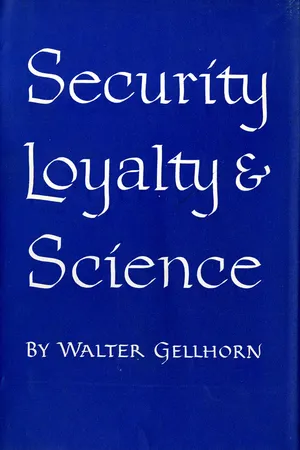
- 312 pages
- English
- ePUB (mobile friendly)
- Available on iOS & Android
Cornell Studies in Civil Liberties
About This Book
Both sides of a sensitive problem are assessed by Professor Gellhorn in this penetrating analysis of national security and its effect upon scientific progress.
The costs and advantages of secrecy in certain areas of science and the conflict between national safety and individual rights in the administration of our federal loyalty program are presented; all the arguments are objectively weighed. The book answers such questions as: Can young scientists be well trained when publication and teaching are not free? Have we gone far enough-or too far-in avoiding "security risks" in important scientific establishments? How does the federal drive against "potentially disloyal" persons actually work? Do "fear of the smear" and crude methods discourage public service by American scientists?
This study, a unit of an investigation of control of subversive activities supported by grants from the Rockefeller Foundation, is based upon two years of research and numerous field interviews of scientists, administrators, defense officials, and educators. Security, Loyalty, and Science is a volume in the series Cornell Studies in Civil Liberty, of which Robert E. Cushman is advisory editor.
Frequently asked questions
Information
Index
Table of contents
- Introduction
- I Keeping Secrets
- II The Balance Sheet of Secrecy
- III The Proper Limits of Secrecy
- IV The Standards and Mechanics of Security Clearance
- V The Spreading of Security Requirements
- VI The Loyalty of Federal Scientists
- VII The Universities and Security Searches
- VIII The Need for Fair Procedures
- IX Concluding Thoughts
- Appendix A Declassification Policy
- Appendix B AEC Criteria for Determining Eligibility for Personnel Security Clearance
- Notes
- Acknowledgments
- Index